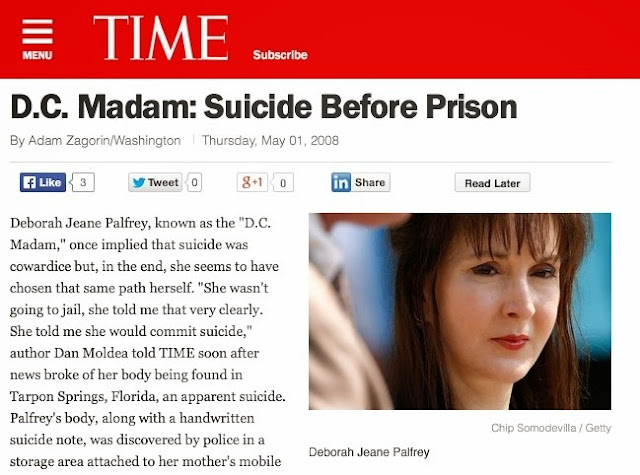The House With The Lights On
It was a neighborhood just like yours, where children rode scooters in the cul-de-sac. And where men circled at night, looking for . . .
By Darragh Johnson
Washington Post Staff Writer
Sunday, May 21, 2006
Brandy Britton is on the floor kissing Penelope, her potbelly pig.
Penelope isn't happy. She grunts, loudly, on the bare mattress in her upstairs bedroom. Britton nuzzles her ear.
"You're a bad, bossy girl," she purrs and kisses the pig's snout. Penelope rolls on her side. With a set of red, square fingernails, Britton tickles the pig's belly.
"You're so bad," Britton says, her voice husky and deep. "Such a bad, bossy girl."
She stands -- slender and stacked, blond curls hanging down her back -- and walks into her bedroom. It's 11:05 p.m. The radio is tuned to 92Q, and the DJ on "The Love Zone" is about to give away a "passion pack," complete with "blindfold and scented candles."
"Why don't you come in here?" Britton says, on her way to change into something more comfortable. Just before disappearing behind a bathroom door that doesn't entirely close, she offers:
"You can sit on the bed."
* * *
This is the 42-year-old woman police accuse of "operating a house of prostitution at her home" on a manicured cul-de-sac in wealthy Howard County.
The woman with a PhD in sociology, an expertise in women's studies and a former career as a well-regarded college professor.
The woman who one day at lunchtime earlier this year opened her front door to an undercover detective, led him upstairs and told him, police would later contend, "to undress and place the money on a table by the door." He set down $400, then slipped back downstairs.
Soon, several detectives and a uniformed officer were swarming into Britton's $400,000 house and, she says, dumping out drawers, pulling clothes off hangers, even sweeping the cartoon magnets off her fridge. Armed with a search warrant, they hauled away their evidence: 150 condoms, lubricant, cash, a vibrator and computer equipment.
They also snapped handcuffs around her slim wrists and took her off to the lockup in Jessup.
Twelve hours later, just before midnight Jan. 17, Britton's dress, coat and shoelaces were returned to her, and she crossed the street to a gas station and called a cab. She'd been booked on four counts of prostitution, each carrying a maximum one year in jail and/or a $500 fine. Misdemeanors. Such cases rarely go to trial.
Britton says she's not guilty and denies the charges. She was framed, she says. It's a clever con job, perpetrated by her second husband.
Her trial has been rescheduled for Thursday. She is still interviewing attorneys.
An anonymous complaint of "prostitution activity" at her landscaped, two-story home in Ellicott City got the vice squad's interest in March 2005.
The caller described "an unusual amount of vehicle traffic" at Britton's house and added, "all of the visitors were male and rarely stayed for more than an hour," police wrote in their request for a search warrant.
The caller also offered a Web site where, police said, they found pictures of "Dr. Britton," noted that she "is listed as 'Alexis,' " calls herself a "natural 38D," advertised to a clientele "that appreciates class with a refreshing down to earth attitude" and gave a phone number.
Police "removed 4 bags of trash" from Britton's curb and found, according to their warrant application, "numerous condoms." They found another Web site, Alexisangel.com, now offline, with pictures and a biography that seemed to match Britton -- proof, police wrote, that Britton "had opened her own agency with other girls working for her."
Then, in December, a "concerned" woman called. She complained that "her husband had been visiting a prostitute," police wrote. "She had confronted her husband, who was spending between $300.00 and $500.00 a month on Britton . . . for sex and fellatio.' "
In a quiet corner of suburbia, where the houses are tidy and the children remarkable -- Britton's neighborhood high school boasts the highest SAT scores in a county with some of the highest SAT scores and household incomes in the region -- this was rare, salacious intrigue.
For months, Bonnie Sorak and other residents on Shirley Meadow Court had speculated about the goings-on at the home of the woman known to take walks at midnight, string Christmas lights at 4 a.m. and always buy candy when schoolkids went door to door. Lately, neighbors had noticed, men in golf shirts driving Lexuses and other nice cars seemed to be frequenting the house. Sorak had idly wondered if Britton was dealing drugs. Another neighbor had joked that she must be turning tricks.
Now, as Sorak pulled up to her house, her two small children in the backseat, she spotted police. Hurriedly closing the garage door behind her, she called her husband: "The SWAT team is over there now."
Who was the woman next door?
* * *
Brandy Britton is beautiful and beguiling. Vulnerable -- it's those huge eyes of hers. Warm and witty, then evasive and chilly. Sexy. Unforgettable.
It's been 20 years, but Sheila Cordray can vividly recall her star student at Oregon State University.
"What's Brandy up to these days?" the retired sociology professor cries into the phone. "I haven't talked to her in years!"
"She started out," Cordray continues, "as one of the brightest students I've ever had. I taught for 21 years. Brandy was, at least, the top 2 or 3 student I ever had."
In the fall of 1986, Britton tried to get into Cordray's upper-level sociology class, Methods of Social Research. The teacher refused. She never let students add her class late, and, anyway, Britton "was obviously pregnant -- about eight months pregnant." No way could she keep up.
But Britton was "absolutely determined," Cordray says. "It was her second child, and she knew what she was getting into, and she had lots of help at home." Nineteen years later, Cordray still recalls the details: "She had the baby on a [Friday] afternoon and she was back in class Monday morning."
She earned an A. She was 23.
"She was very mature for her age," Cordray says, "and brilliant. Really brilliant."
* * *
Her mother is on the phone. Victoria Britton doesn't speak much to her daughter, and when she hears of the police raid on Brandy's house, she asks the reporter one question: Was her granddaughter at home?
The girl, now a 19-year-old student at the University of Maryland at College Park, was supposed to have been in Colorado visiting her 21-year-old brother.
"I gave her a ticket," Victoria Britton says. "But I haven't heard from her."
A pause, then, "Oh, those poor kids."
She asks about Britton's job. She says, "I" -- pause -- "thought she was doing a research job." Then, "Yes. She's had financial trouble for several years." Then, "Ah, brother." Then, "There is a lot. . . . She's just got some other problems that have gone on for years."
She says goodbye. She has to call her grandchildren.
But before hanging up, she adds one more thing about her daughter: "She's very supportive of women, and very sympathetic to women who have to do -- "
She doesn't finish the sentence.
* * *
The cul-de-sac is cold and dark.
Britton has agreed to an interview, but at the appointed time, nobody is home but a big black dog, who barks and hurls itself against the leaded glass doors. There is no doorbell, just a scraggle of wires poking outside the doorframe.
Then she calls. She's running late, wants to meet at Starbucks. She orders a grande white mocha Frappuccino light with whipped cream and an extra shot of espresso, plus an espresso brownie -- at 9:35 at night.
Britton does not dress for practicality. Tonight, despite the chill, she wears high-heel wedge sandals and thin brown pants that flare when she walks. She's got bangs and long, loose ringlets in her hair, and her lips glimmer with a petal-pink gloss that's very Bobbi Brown -- very wedding-day pale.
She hates that the reporter called her mother.
"We don't talk," she snaps.
But she asks what her mom said. The anger drains from her face. The answer to her next question matters very much.
"Did she believe it?"
For the next hour, Britton pulls at the Frappuccino straw as if she's at the malt shop and tells the story of a conventional girlhood near Portland, on a berry farm in Boring. "There was a big sign." She laughs. "Welcome to Boring, Oregon."
When she was little, she played dress-up with her sister. In high school? Track, swim team, cheerleader. She wrote a column for the school paper called "Brandy Bears It." Coyly, she explains, "We were the Bruins."
A guy in a green apron interrupts. They're closing.
Britton stands and offers to lead the way back to her house. She points to the parking lot. "I'm in the old burgundy Nissan."
Her voice rises.
"Even though I run a prosti tution ring" -- the heads of two customers whip around and stare -- " supposedly ," she emphasizes, "I don't have any money."
* * *
What happened? Britton was such a remarkable young woman, the first in her family to go to college when she entered Oregon State at 19, "a starry-eyed little girl who wants to be a vet," she says. She wound up majoring in biology and sociology and took seriously the professor who told her, "It's not enough to study the problems of the world. We have to do something about them."
She became an activist. While earning two degrees, with honors, and rearing two children with her first husband, Britton volunteered at a battered women's shelter and helped create the university's first "safe ride" program for escorting women on campus at night.
By the time she turned 30, she was finishing her PhD in sociology from the University of California at San Francisco and would soon be headed east to an assistant professorship at the University of Maryland Baltimore County.
At first, in Baltimore, things went well. Very well.
Other professors called her work "really top-notch" and "invaluable." The College of Arts and Sciences dean praised her "outstanding service record" and mentoring skills. Her students wrote letters:
"When your life as a woman is difficult," read a note from Bonnie Woodall, dated Dec. 16, 1996, "and you think that what you do is in vain, remember the students you have taught. . . . You have made a difference."
When Britton got a raise, her department chairman, Derek Gill, sent a personal note of congratulations. When she received a $1.6 million grant from the National Institutes of Health to study the link between violence and drug use in poor women in Baltimore, he called it "a remarkable achievement for an Assistant Professor in her third year of UMBC."
But the workload was taxing -- and getting worse. Britton asked for extra compensation. Gill agreed. The university didn't. Her request was denied, although a similar request by a male colleague was granted.
More injustice, she perceived. Her activism took over. Her mother had taught her to "fight back," as Britton wrote in the dedication to her dissertation. So she did.
Memos circulated back and forth, creating in her department (as one memo put it) "a blizzard of written and verbal communication." There were investigations into Britton's NIH grant; grumblings by her fellow faculty and complaints by students that included, according to court papers, Britton's "calling them late at night and demanding they come to her house for something work related and then failing to answer the door."
Only a few years earlier, she had experienced a similar undoing in California: She left her job researching drug abuse amid a blaze of litigation -- and sued her employer for gender discrimination. Now, in Baltimore, Britton's life was imploding again. She filed another gender discrimination lawsuit, this time suing UMBC for $10 million. (A federal judge would later dismiss the case; a UMBC spokesman declined to discuss the case while Britton's appeal is pending.) Just before Christmas 1999, she quit the university she once saw "as a stepping stone."
By then, many in her department had turned against her -- a corrosive fact made obvious when her department chairman had a heart attack. Britton asked about visiting Gill in the hospital. Instead, she alleged in court papers, she received a voice mail from the graduate student dating Gill:
"Brandy . . . this is a message direct from Dr. Gill. There is no person on Earth he'd rather see less than you. . . . Stay away from him, leave us alone. You have been a major contributor to this."
* * *
The Frappuccino is half-finished.
She has changed into black sweats, black cardigan and an oversized Testudo's Troops T-shirt, and she materializes in her bedroom -- a place of Asian-inspired tranquility, complete with a canopy bed draped in chiffon, beaded curtains and floating shelves of Asian statues.
Crawling onto the bed, she sits cross-legged and talks for another 4 1/2 hours. Night turns to early morning, and she periodically stands at the end of her bed, stroking the skin of her lower stomach and upper thigh. It's an unconscious habit, like twirling her hair or picking at her cuticles.
She believes, she is saying, her colleagues at UMBC got together and decided, "How are we going to do her in?" She believes they wiretapped her phones and put her under other kinds of surveillance. "I was devoted," she continues. "I spent my whole life working for that. . . . It wasn't just a job to me. It was my life." She left UMBC and "just thought, 'I'm going to lay down and die. I'm so depressed.' "
Since quitting, she has filed for bankruptcy twice and struggled against five foreclosures on her Ellicott City home. In 2001, she filed a $30,000 lawsuit after a car accident, settling later for an undisclosed amount. For about seven months, between October 2003 and April 2004, Britton worked for the Baltimore City Public Schools in the research department.
Ask where she's worked in the past couple of years, and she starts to answer, then suddenly recommends a book: "Sex Work: Writings by Women in the Sex Industry."
* * *
"It's been a descent for Brandy," her mother says. "Life was going badly. . . . She wanted someone there for her."
That someone turned out to be Isamu Tubyangye.
They met online in March 2002, when Tubyangye answered her Yahoo.com personal ad. He was a 6-foot-5, 31-year-old who worked, she says, for AOL.
Three months later, they married, and over the next three years, Britton, who wrote her dissertation on battered women, filed several domestic violence reports against Tubyangye: "He assaulted me with . . . wooden shoes, a chair"; "tied me up with strapping tape"; "stabbed me in the neck." In a request for a restraining order against him, she wrote: "He attacked me when I tried to discuss separation." Though she filed for divorce six months after their wedding, the paperwork was never finalized.
Tubyangye, who did not respond to repeated voice and e-mail messages asking for an interview, was charged several times with first- and second-degree assault. He, too, petitioned the Howard County court with his own accusations, including that Britton's request for a restraining order came a convenient seven days "after I had given her all of my student loan money . . . $8600," and "my wife is in possession of an unregistered firearm."
By the beginning of last year, Tubyangye was charged with two counts of second-degree assault and one count of violating his probation by violating the restraining order. A bench warrant was issued, and he was briefly jailed in March 2005. That's when, Britton says, he attempted to frame her by directing police to a Web site where Britton appeared to be advertising herself as a prostitute.
And now, she says, "they've decided to go after me instead of him."
* * *
But what about the other Web site? The Alexis Angel Web site. The defunct site that police say shows she had "other girls working for her." The site with erotic pictures of the naked front and back sides of a woman who looks a whole lot like Britton. The site that begins with this disclaimer:
"Money exchanged . . . for modeling is simply for my time and companionship. . . . This is not an offer of prostitution."
The site where Alexis is described as a "quintessential 'brick house' " and "sophisticated, refined, educated and articulate. She has two Bachelor of Science degrees, one in biology and the other in sociology. She also holds a Ph.D. from an elite university." It continues: "An athlete, cheerleader and dancer in high school, Alexis has continued her . . . training and is extremely flexible in excellent shape." It ends, "I AM VERY CREATIVE AND LOVE TO TRY NEW THINGS."
Alexis's fees rival those of a K Street lawyer. An "incall" (at her house) service for "individual clients" runs $300 per hour, $550 for two hours, $800 for three hours. Couples pay almost double those rates, and "two-girl services" cost more than double.
The phone number on the site is Britton's cell.
The domain name is registered to her.
The question is asked:
What about Alexis Angel?
The woman who can make a Frappuccino last six hours and discuss -- at length -- everything from playing dress-up to fighting for underprivileged women, takes a final draw on her green Starbucks straw. She sets the plastic cup on the nightstand.
Her face has hardened.
"I can't discuss that with you."
* * *
Now there's a new Web site, featuring "Claire."
This site displays an open antique book and a still life of French wine, plump grapes and fine cheese -- and a gallery of erotic photos of a nearly naked woman, adorned only in a selection of feather boas, garter belts and bits of black lingerie.
Like Alexisangel.com, the site offers a bio of Claire as "sophisticated, refined, educated and articulate. She holds a post-graduate degree from an elite university." And: "An athlete, cheerleader and dancer since childhood, Claire has continued her dance and athletic training and is extremely flexible and in excellent physical shape." Linked reviews praise Claire in quite complimentary terms. Exults one: "She took several months off and is just back!! It has been 3 very long months waiting for her!!!"
On Mother's Day, in the late afternoon, Britton answers her front door, agitated and dressed in a little red T-shirt, black nylon shorts and bare feet. She is upstairs "with my kids," she says, and can't talk to the reporter now. She says goodbye and begins closing her leaded glass door, and for a moment, the words of her T-shirt are caught in the frame of the door:
"Bad Girl," it says across her chest, "with good intentions."
Staff researcher Meg Smith contributed to this report.
CORRECTION TO THIS ARTICLE
A credit was omitted from the photo of Brandy Britton's home that appeared on the front of the May 21 Style section. The photo was taken by staff photographer Mark Gail.
CORRECTION TO THIS ARTICLE
A Jan. 30 Metro article said that former college professor and alleged call girl Brandy Britton was found dead in the living room of her Howard County home. Police have not disclosed the room in which her body was found.
Trial Nearing, Alleged Call Girl Found Dead
By Darragh Johnson
Washington Post Staff Writer
Tuesday, January 30
She was a former college professor who had lost almost everything -- her stellar academic reputation, her financial well-being and her anonymity in the swanky suburban neighborhood where she was accused of working as a high-priced prostitute.
With Brandy Britton's trial planned to start next week, the former University of Maryland Baltimore County professor apparently took her own life over the weekend, hanging herself in her living room, Howard County police say. A family member found the body Saturday afternoon. Police say they do not suspect foul play.
It was a grievous end to a life that friends and colleagues say was once filled with remarkable promise and ambition.
Britton, 43, was the first in her family to go to college, double-majoring in biology and sociology. Her first sociology professor, Sheila Cordray, told The Washington Post last year that Britton was "one of the brightest students I've ever had."
The woman whose looks matched her intelligence may still have possessed the long, blond hair, the glossy pink lips and the glamorous figure of her youth. And she may have still projected the warm, friendly demeanor of a small-town girl from Oregon.
But she was facing the world's toughest truth: She had no idea who she was about to become.
Her trial date on four counts of prostitution -- which she had decided to fight in a jury trial instead of accepting a plea agreement -- was set for Monday. Police would get a chance to air their version of Brandy Britton: that in her $400,000 home at the end of a cul-de-sac where children ride Razor scooters and moms drive minivans with soccer decals, Britton had been selling herself as a call girl.
She called herself Alexis, police said and advertised on a Web site that described Alexis as a "quintessential 'brick house' " and "sophisticated, refined, educated and articulate. She has two Bachelor of Science degrees, one in biology and the other in sociology. She also holds a Ph.D. from an elite university." It continued: "An athlete, cheerleader and dancer in high school, Alexis . . . is extremely flexible in excellent shape."
In a sting, Howard police sent an undercover officer to her house last January and arrested her.
Britton heatedly denied the allegations, but when The Washington Post asked her last year how she had been supporting herself since leaving UMBC in late 1999 and a subsequent job with the Baltimore public schools, she started to answer, then suddenly recommended a book: "Sex Work: Writings by Women in the Sex Industry."
Fighting on Several Fronts
Her attorney, Christopher Flohr, has been out of his office taking care of his ailing father and had hoped to postpone her trial date. Flohr's partner, William Paul Blackford, heard the news of her death yesterday morning when The Post called. He sat in silence for several moments, then spoke of her other recent court battle: foreclosure hearings on her home.
He talked about Britton's fears that she would lose the house where she had raised two children, now grown, as a single parent and where she had been living with her two potbellied pigs, dog and two cats.
"That is one of the most heart-wrenching processes for a person to go through," Blackford said, continuing to talk, then interrupting himself, as though the news about Britton's death had just sunk in. "This is horribly sad."
Blackford suggested that Britton's state of mind lately was comparable to a starkly clean and ultra-modern home -- as Britton had decorated her living room and den, complete with sleek black leather couches -- and then "there's a stack of magazines in the living room and then there's a hamper," and then the mess has crept across everything.
"Her house," he added, "I think it's fair to say, it wasn't impressive."
Britton was a scramble of complications: She lived in a landscaped home with leaded-glass front doors that disguised the scratched-up carpet and scuffed walls inside. She was a sharp researcher whose dissertation focused on abused and battered women who then found herself, a few years ago, filing domestic-violence charges against her second husband: "He . . . tied me up with strapping tape" and "stabbed me in the neck," she told police.
In a statement yesterday, Flohr said that Britton's death "underscores an important question: Was the public benefited at all by the resources spent on her arrest and prosecution? As we ponder the apparent senselessness of her passing, we must openly wonder about . . . a criminal justice system that seeks to punish a person rather than heal them."
Confusion and Depression
"It's been a descent for Brandy," her mother, Victoria Britton, said last year from her home in Oregon. She did not return calls for comment yesterday.
Victoria Britton had cheered, she said, when her daughter earned a PhD in sociology and arrived in the mid-1990s at UMBC, where she received raises and raves from other professors, who called her work "really top-notch" and "invaluable."
But the raves subsided after Brandy Britton filed a $10 million sex discrimination suit against UMBC -- one mirroring the suit she had filed against her California employer just before joining UMBC. She left the university at the end of 1999.
"I spent my whole life working for that," she told The Post last year, as she talked about her PhD and her identity as a college professor. "It wasn't just a job to me. It was my life."
And now, she continued, she had no idea what would happen next -- or whom she could next become. Her fight with UMBC would keep her from ever teaching again. Already, she believed, "they" were tapping her phones and bugging her home.
It was too much, she said, and she found herself thinking:
" 'I'm going to lay down and die. I'm so depressed.' "

Deborah Jeane Palfrey, known as the "D.C. Madam," once implied that suicide was cowardice but, in the end, she seems to have chosen that same path herself. "She wasn't going to jail, she told me that very clearly. She told me she would commit suicide," author Dan Moldea told TIME soon after news broke of her body being found in Tarpon Springs, Florida, an apparent suicide. Palfrey's body, along with a handwritten suicide note, was discovered by police in a storage area attached to her mother's mobile home. Palfrey contacted Moldea last year to provide her help writing a book. "She had done time once before [for prostitution]," Moldea recalls. "And it damn near killed her. She said there was enormous stress — it made her sick, she couldn't take it, and she wasn't going to let that happen to her again." Palfrey had been free pending her scheduled July 24 sentencing on a series of racketeering and money laundering charges as part of running a prostitution ring that had as clients many prominent Washingtonians, including Senator David Vitter of Lousiana. She faced as many as 55 years behind bars (though sentencing guidelines could well have limited her prison time to a maximum of 71 months.)
When a former employee of Palfrey's, Brandy Britton, hanged herself before going to trial, Palfrey told the press, "I guess I'm made of something that Brandy Britton wasn't made of."
Palfrey's trial, which concluded in mid-April with a conviction, is one of very few such cases prosecuted in the federal courts. Most prostitution violations are dealt with at the state or municipal level, and attract little publicity. In the Palfrey case, prosecutors obliged a string of obviously embarrassed clients and employees of the escort service to appear on the witness stand and testify under oath. Nearly all testified that they had engaged in sexual acts in exchange for money, a version of events that contradicted Palfrey's claims that she had been running a high-end sexual fantasy service — and that any actual sexual activity was against the rules, and clearly stated when employees were hired.
Palfrey ran her operation — which covered the Washington D.C., Baltimore and northern Virginia area — by telephone from her home in California. Clients would contact her, often in response to advertisements in Washington newspapers and magazines, and she would set them up with women. According to court testimony, Palfrey would sometimes even contact clients for after-action reports to determine whether her employees were doing their job correctly and enthusiastically.
It was Palfrey's phone records that led to problems for prominent Washington figures once her prosecution got under way. She had thousands of pages, including 10,000 to 15,000 numbers of clients calling in to her California residence. Besides Sen. Vitter, others whose names appeared on those records included Randall Tobias, a senior State Department official in charge of foreign aid — who had publicly inveighed against prostitution and who quickly resigned after his name was made public. Harlan Ullman, a well-known military specialist at the Center for Strategic and International Studies, a Washington think tank, was also identified.
According to Moldea, who last year examined Palfrey's phone records and discovered the name of Vitter, a Republican, as a client of Palfrey's escort servie — Pamela Martin & Associates — the last time he saw Palfrey in person was less than week before her conviction on prostitution charges on April 15. "A friend and I met with Jeanne and we had a sushi lunch near the courtroom," he said. "She was upbeat and hopeful. She felt the prosecution had not made the case and that she was going to walk. She was hopeful to the end." But, when the jury came in with her conviction, she reportedly was taken aback. "When I heard that I knew that, for her, it was all over. There is no question in my mind that she took her own life."
Vitter remains a Senator and has not been censured, despite coming under intense public criticism. Of Palfrey, Moldea said, "I liked her. She was a good person, she was kind, funny, she had a sense of humor, and what she may have done in business, I bring no judgment to that. You have to remember that all those who worked for her service and those who used it — none of them were held to account, or punished. And now, she is dead."




















